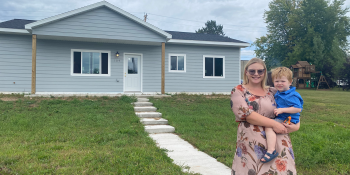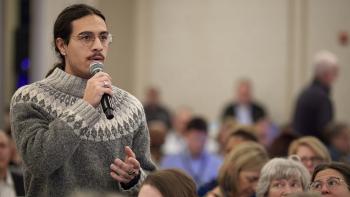
Habitat accesses federal funding to increase affordable homeownership in Minnesota
More than half of renters in St. Louis County, Minnesota, spend 30% or more of their income on rent — and a quarter spend 50% or more of their income on rent. The county’s old housing stock continues to age, and affordable housing development lags far behind the demand, making it difficult for aspiring homebuyers to achieve homeownership.
Since its founding in 1995, North St. Louis County Habitat for Humanity has partnered with families to build affordable homes. However, with the need for affordable housing reaching such critical levels, the affiliate began searching for ways to grow its homebuilding efforts and help more families secure affordable homeownership opportunities.
Finding a new funding source
In 2011, North St. Louis County Habitat began partnering with the U.S. Department of Agriculture after learning of the agency’s rural housing programs. Habitat affiliates working in rural communities across the U.S. have worked closely with the USDA to scale affordable homeownership opportunities through federal funding mechanisms like the 502 Direct Loan Program.
Through the 502 Direct Loan Program, the USDA repays developers, including Habitat, for the cost of building a home. “As soon as the house is ready to close, the USDA pays the full value of the loan upfront so that Habitat can then use those funds to build a home alongside another family,” says Nathan Thompson, North St. Louis County Habitat executive director.
North St. Louis County Habitat identifies families who might qualify for the USDA loan out of their own pool of applicants and helps prospective homebuyers complete the USDA application. Then, unlike our traditional model where Habitat serves as the mortgage lender, homeowners participating in the 502 Direct Loan Program make their monthly mortgage payments to USDA.
“When we have a family partnering with us and USDA, it’s essentially a full-house sponsorship. Without USDA, we wouldn’t be able to build as much,” Nathan says. “It increases our capacity.”
Financial support from federal agencies like USDA and the U.S. Department of Housing and Urban Development can have a major impact on the number of families Habitat affiliates can partner with. That’s why Habitat for Humanity International rallies affiliates, partners, volunteers and homeowners to shape and champion policies that advance affordable housing solutions. With increased federal funding, entry-level homeowners like Teelyn can access affordable homeownership.
Having space to grow
Teelyn heard about North St. Louis County Habitat from friends and applied for the affiliate’s homeownership program. Upon reviewing her application, Marnie Maki, North St. Louis County Habitat’s family service manager, found that Teelyn’s credit score and annual income as a career counselor likely qualified her for the USDA 502 loan.
Marnie and Teelyn partnered closely with USDA to complete her application, and soon her loan was approved. Moving into her Habitat home meant more space for Teelyn and her 2-year-old son Isaiah, who were living in Teelyn’s mom’s house in Hibbing, Minnesota. Teelyn loved having her mom around to help raise Isaiah, but the family quickly began to outgrow the two-bedroom home. Teelyn gave her room to Isaiah and slept on a mattress in the living room.
Teelyn was joined by community volunteers as she built her three-bedroom North St. Louis County Habitat home in Buhl, Minnesota, just 15 minutes from her mom’s house.
“The best part is having our own space. At my mom’s, it was so crowded. It feels like a breath of fresh air being here,” Teelyn says.
Serving more families in rural Minnesota
To date, eight families in North St. Louis County Habitat’s homeownership program have originated their mortgage through USDA’s 502 Direct Loan Program. North St. Louis County Habitat still serves families through its traditional Habitat mortgage, but the partnership with USDA has directly increased the affiliate’s capacity to reach even more families like Teelyn’s.
“The number of families that are cost-burdened in our area is growing. The funding we receive from our federal sources is super valuable.”— Nathan Thompson, North St. Louis County Habitat executive director
Federal funding must increase to meet the country’s tremendous housing supply challenges, especially for entry-level homeownership. As vocal and leading housing advocates, Habitat continues to call on the U.S. Congress to prioritize policies that advance affordable homeownership opportunities and increase funding for housing programs like USDA’s 502 Direct. With support from USDA, HUD and other federal agencies, we can move closer to fulfilling our vision of a world where everyone has a decent, affordable place to live.
Two other ways federal funding supports North St. Louis County Habitat’s work:
1. In each of the last two years, North St. Louis County Habitat has received US$60,000 of federal funding earmarked for land acquisition through the government’s Community Development Block Grant. Nathan says nearly all the land the affiliate uses to build homes has been acquired using block grant funding.
2. Every prospective North St. Louis County Habitat homeowner attends a first-time homebuyer course led by the Arrowhead Economic Opportunity Agency, a local organization that distributes federal funding throughout the community. Upon finishing the course and signing a purchasing agreement with the affiliate, the homebuyer receives US$6,000 to offset closing costs. Teelyn says the funds “took all the burden off” of the expensive closing costs.
Learn how you can join Habitat to advocate for housing policies and funding to help more families have access to a stable, affordable place to call home.

